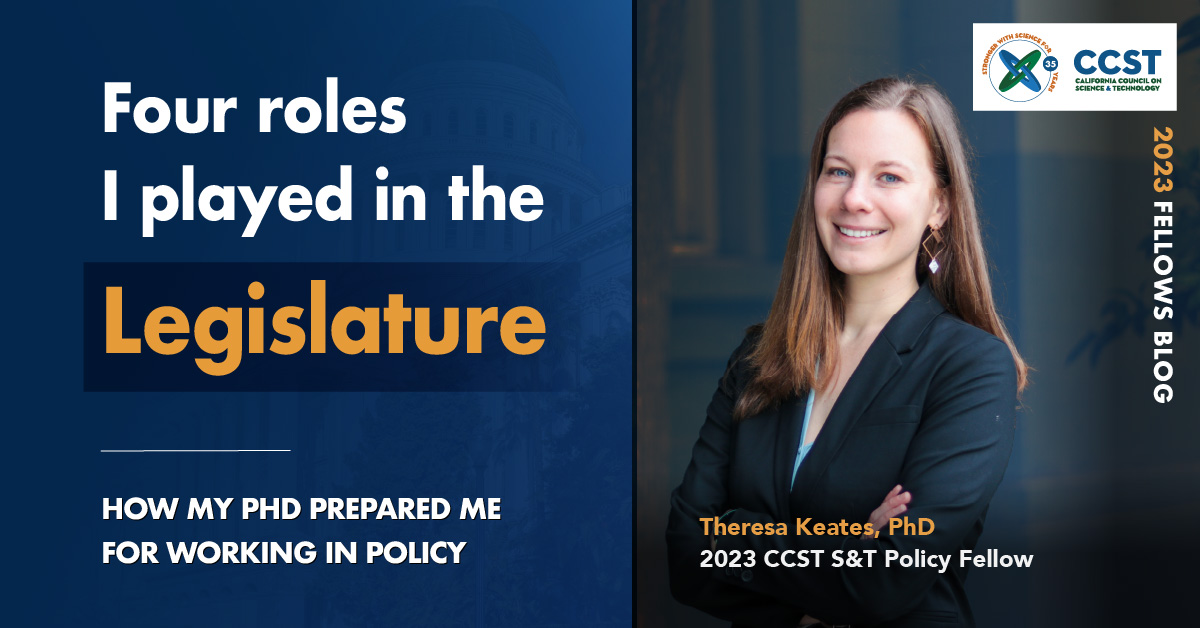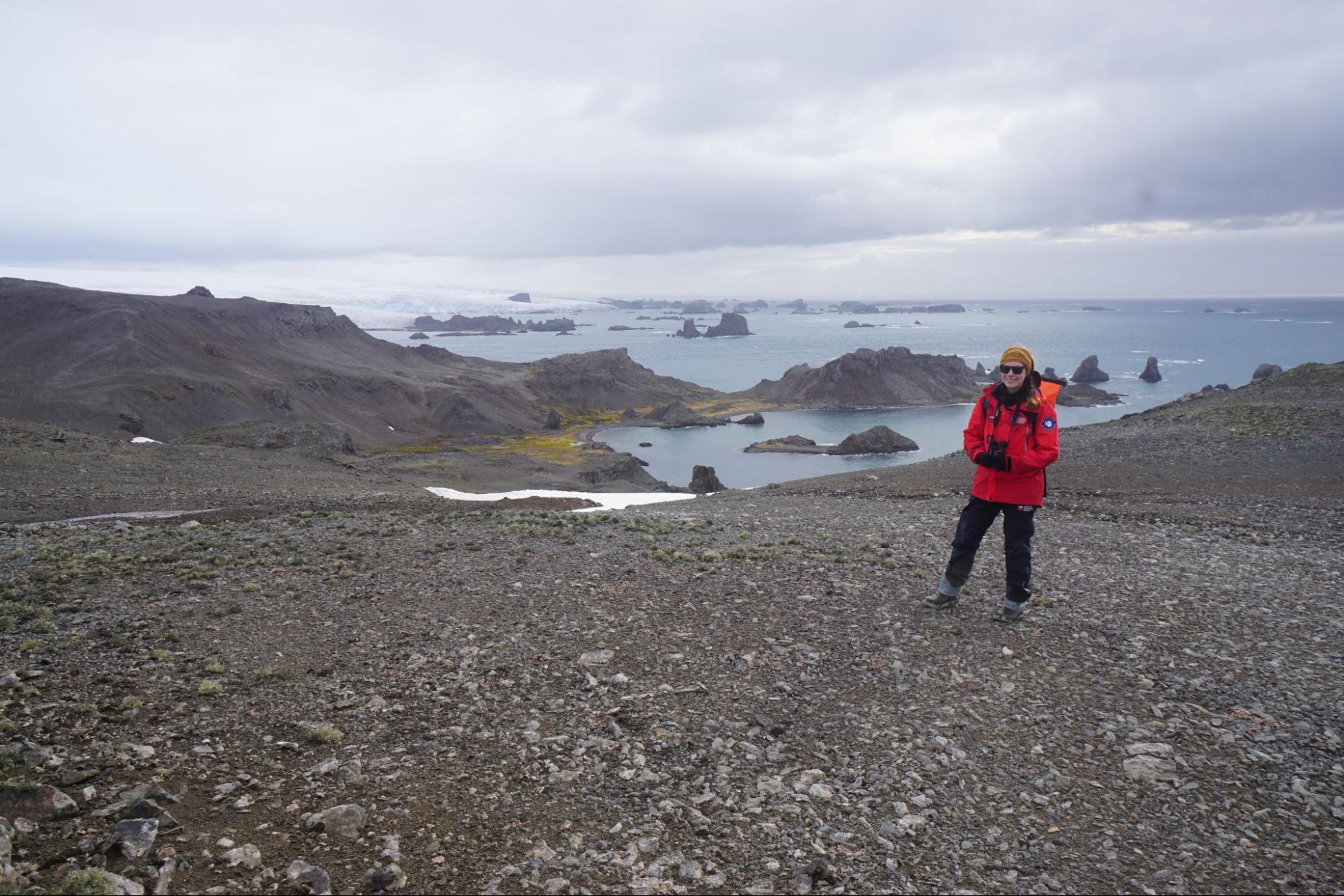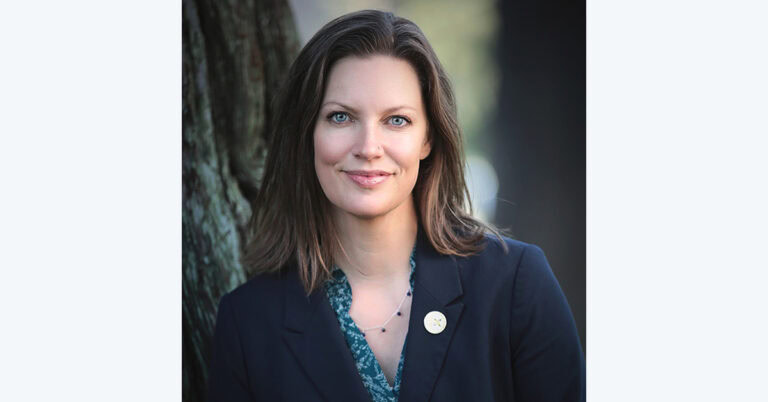Deputy Director
Four Roles I Played in the Legislature: ’23 Fellow Theresa Keates, PhD
September 19, 2023 | CCST Newsroom, CCST S&T Policy Fellows

Making a Big Career Change
After years of crafting my skills as a scientific researcher — refining my techniques, feeling confident in my workflow from reading papers to collecting data in the field, and completing my PhD — I was excited (and a little nervous!) to embark on this new science policy journey. I think I can speak for most CCST S&T Policy Fellows in feeling this way, the mixed emotions of learning how to play a new role that seems entirely different from what we learned dedicating years to scientific training.
In my placement with the Senate Environmental Quality Committee, I learned that a committee consultant can wear many different hats. I also realized that my scientific training had prepared me to be successful at many of the new tasks given to me, while certain roles required me to learn skills that I was much less practiced in.

The Many Roles of a Fellow
There was no shortage of new roles to play during my fellowship year, but there are four in particular I want to highlight: the analyst, the oral communicator, the negotiator, and the adaptable responder.
1. The Analyst
Perhaps the most familiar task to those from science backgrounds who have spent time collecting and analyzing data, the bread and butter of my placement was analyzing bills. I gathered background information on a policy area, assessed the potential impact of proposed policy, and summarized these in a bill analysis to be used by elected representatives deciding how to vote.
Unlike my research work before, where I had months or years to build expertise on a topic, I often needed to learn about topics new to me in a matter of weeks or days. I was turning from a specialist – who spent six years investigating how physical processes in the ocean affect predators looking for food – into more of a generalist.
I was excited to be able to develop expertise in a range of topics:
- Strategies to reduce greenhouse gas emissions
- Environmental permitting
- Carbon capture
- Hydrogen
- Toxic materials
- Environmental justice issues
- Recycling, and more.
In addition to reading up on topics (which I was used to doing), this process also involved a lot of talking to people, something I had done far less of in my scientific research work. Hearing the perspectives of stakeholders, such as first-hand accounts from community members who have been burdened by environmental pollution, was eye-opening and brought greater meaning to the policy issues before me.

Unlike my research work before, where I had months or years to build expertise on a topic, I often needed to learn about topics new to me in a matter of weeks or days.
2. The Oral Communicator
While comprehensive bill analyses full of well-researched background information are useful, these written analyses often need to be supplemented with high-level summaries. In a fast-paced legislative environment, not everyone has the time to delve into the details of a bill like I did. This is where effective oral communication skills come in to concisely convey the most important information.
Anyone who has needed to explain to a non-scientist what their research was on and why it matters knows the challenge I’m talking about. I honed this skill frequently in briefings, explaining complex bills to the committee Chair or staff of other Senators on the Environmental Quality Committee, and answering any questions along the way. While it wasn’t easy to summarize complex information in a few sentences — discerning which points were most critical to my audience — it got easier.
I am grateful for the many opportunities to practice. Making information readily accessible is critical to allowing that information to be used effectively. This skill is valuable far beyond science or policymaking.
Hearing the perspectives of stakeholders, such as first-hand accounts from community members who have been burdened by environmental pollution, was eye-opening and brought greater meaning to the policy issues before me.
3. The Negotiator
Good policy is crafted with many voices at the table, and inevitably, not all of those voices agree. A major role of a committee consultant is to navigate often conflicting inputs and to negotiate amendments to bills. Apart from growing up with a sibling and navigating conflicting interests when it came to weekend activities or sharing clothing, this negotiator role was not one I had a lot of experience with.
Coming from a scientific background, I was used to letting data (i.e., numbers) inform conclusions: generally fairly straightforward. Suddenly, I had a lot more information to consider: anecdotes from stakeholders about how issues affect them, how different policies might need to be prioritized when resources are limited, and political implications of making certain decisions, just to name a few. Hearing all of these inputs gave me a much greater appreciation for the complexities of the policymaking process: the importance of considering multiple perspectives and thinking through potential consequences. Determining a prudent way forward helped me develop effective negotiation skills, such as focusing first on common values and goals.

4. The Adaptable Responder
The landscape surrounding policy discussions is constantly subject to change. New information may come to light, an advocacy organization may propose last-minute amendments, or the way a different policy progresses through the legislative process may affect one I am working on.
Gone were the days of having months or years to work on a scientific manuscript and get input from all coauthors: decisions needed to be made quickly based on the best information available at the time. In a few cases, much like a presidential candidate on the eve of Election Day having both an acceptance speech and a concession speech ready to go depending on the events of the day, I wrote two different versions of a bill analysis — either one ready to move forward quickly depending on how things played out.
One of the big lessons I continue to learn is to be comfortable with uncertainty: collect the information you can but be ready to change course. Adaptability to a dynamic legislative landscape is an important part of the process of developing sound policy.
There is No Instruction Manual, but Plenty of Mentorship
The different roles of a committee consultant did not come with an instruction manual. They did, however, come with excellent mentorship supporting me as I tried my hand at these different tasks. The program embeds mentorship throughout, with an assigned alumni mentor, an office mentor, and the availability of program staff and alumni whenever needed.
This unique opportunity as a CCST S&T Policy Fellow gave me unparalleled first-hand experience of how policy is made in California. The skill set I developed will be invaluable in whatever role I take on next in my career. Now, I look back at my excitedly nervous feelings at the start and realize, taking this plunge was hard, but I did bring skills allowing me to adapt to this new role and had the ability to quickly develop new ones. I grew so much during my fellowship year and am excited to see what comes next.

About the CCST Science & Technology Policy Fellowship
The CCST Science & Technology Policy Fellows program places PhD-level scientists, engineers, and social scientists in the California State Legislature, State Agencies, and Offices of the Governor for a year of public policy, leadership training, and public service—training scientific thinkers to be policy-savvy, while helping equip California’s decision makers with science-savvy staff. Discover how our CCST S&T Policy Fellows make a difference in California’s policy arena and learn how to apply at CCST.us/CCST-Science-Fellows-Program.




